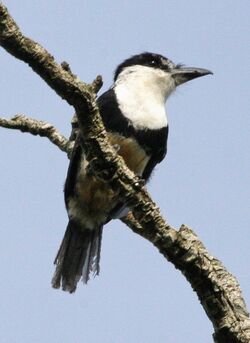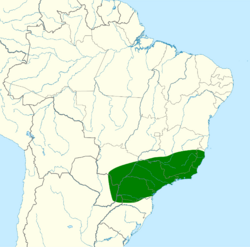Biology:Buff-bellied puffbird
| Buff-bellied puffbird | |
|---|---|

| |
| Scientific classification | |
| Domain: | Eukaryota |
| Kingdom: | Animalia |
| Phylum: | Chordata |
| Class: | Aves |
| Order: | Piciformes |
| Family: | Bucconidae |
| Genus: | Notharchus |
| Species: | N. swainsoni
|
| Binomial name | |
| Notharchus swainsoni (Gray, 1846)
| |

| |
The buff-bellied puffbird (Notharchus swainsoni) is a species of bird in the family Bucconidae, the puffbirds, nunlets, and nunbirds. It is found in Argentina , Brazil , and Paraguay.[1]
Taxonomy and systematics
During the second half of the twentieth century, the buff-bellied puffbird and what are now the white-necked puffbird (N. hyperrhynchus) and Guianan puffbird (N. macrorhynchus) were treated as conspecific. It is now treated as its own monotypic species.[2][3][1]
Description
The buff-bellied puffbird is about 23.5 cm (9.3 in) long and weighs 72 to 75.6 g (2.5 to 2.7 oz). The crown and upperparts are black with a green gloss and buffy edges to the feathers. It has a narrow white forehead, throat, and upper breast. The sides of the face and a thin band around the nape are grayish white. A wide black band separates the upper breast from the buffy to pale rufous belly. The flanks are gray. Its eye color can be straw, brown, or red.[3]
Distribution and habitat
The buff-bellied puffbird is found in eastern Paraguay, far northeastern Argentina's Misiones Province, and in southeastern Brazil from southern Bahia and Espírito Santo south to Santa Catarina. It is resident in Argentina but possibly moves from other parts of its range into São Paulo state in the austral summer. It inhabits lowland humid primary and secondary forest.[3]
Behavior
Feeding
The buff-bellied puffbird hunts by sallies from a high bare perch to capture insects and sometimes small vertebrates; it also eats some fruits. It investigates army ant swarms.[3]
Breeding
The buff-bellied puffbird breeds in September and October in the southern part of its range; the season elsewhere is not known. It excavates a nest cavity in an arboreal termitarium, and all other known breeding phenology at least for the Paraguayan subspecies is limited to one research paper.[4]
Vocalization
The buff-bellied puffbird's song is a "descending sequence of whistles, varying in rhythm, 'ui-ui---dibule-dibule...'."[3]
Status
The IUCN has assessed the buff-bellied puffbird as being of Least Concern. It has a reasonably large range, and though its population has not been quantified it is believed to be stable.[5] It has apparently expanded its range in Brazil since about 2000 and occurs in several protected areas.[3]
References
- ↑ 1.0 1.1 Gill, F.; Donsker, D.; Rasmussen, P. (July 2021). "IOC World Bird List (v 11.2)". https://www.worldbirdnames.org/.
- ↑ Remsen, J. V., Jr., J. I. Areta, E. Bonaccorso, S. Claramunt, A. Jaramillo, D. F. Lane, J. F. Pacheco, M. B. Robbins, F. G. Stiles, and K. J. Zimmer. Version 24 August 2021. A classification of the bird species of South America. American Ornithological Society. https://www.museum.lsu.edu/~Remsen/SACCBaseline.htm retrieved August 24, 2021
- ↑ 3.0 3.1 3.2 3.3 3.4 3.5 Rasmussen, P. C., N. Collar, and G. M. Kirwan (2020). Buff-bellied Puffbird (Notharchus swainsoni'), version 1.0. In Birds of the World (J. del Hoyo, A. Elliott, J. Sargatal, D. A. Christie, and E. de Juana, Editors). Cornell Lab of Ornithology, Ithaca, NY, USA. https://doi.org/10.2173/bow.bubpuf1.01 retrieved October 30, 2021
- ↑ Matthews, Alexander; Smith, Paul (2017). "Breeding observations on Buff-bellied Puffbird Notharchus swainsoni (Piciformes: Bucconidae) at Rancho Laguna Blanca, San Pedro Department, Paraguay". Revista Brasileira de Ornitologia 25: 20–23. doi:10.1007/BF03544372. https://link.springer.com/article/10.1007/BF03544372.
- ↑ Cite error: Invalid
<ref>tag; no text was provided for refs namedIUCN
Wikidata ☰ Q1273277 entry
 |


